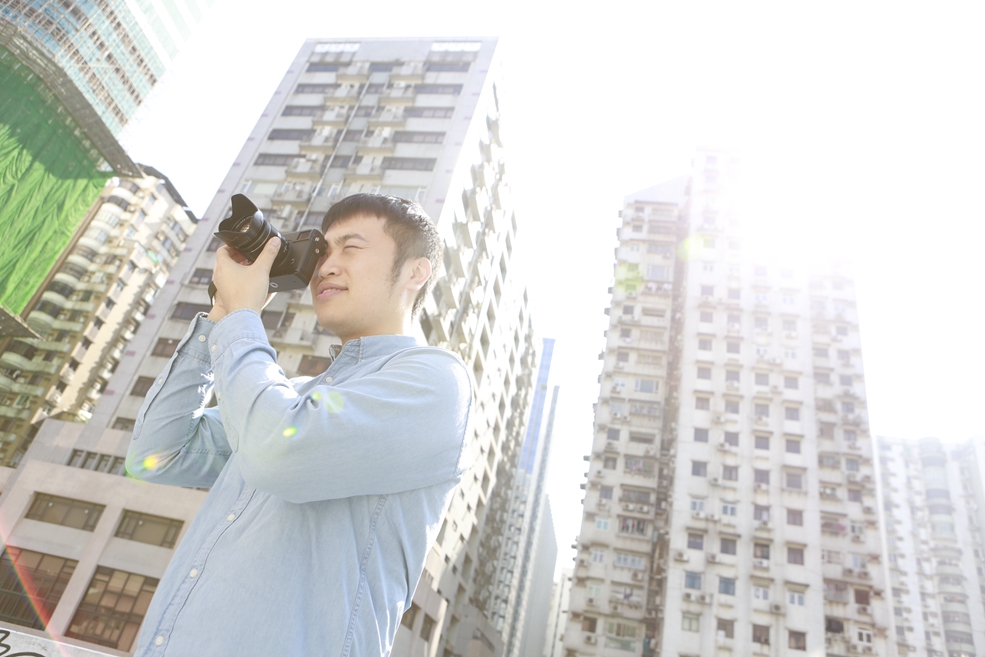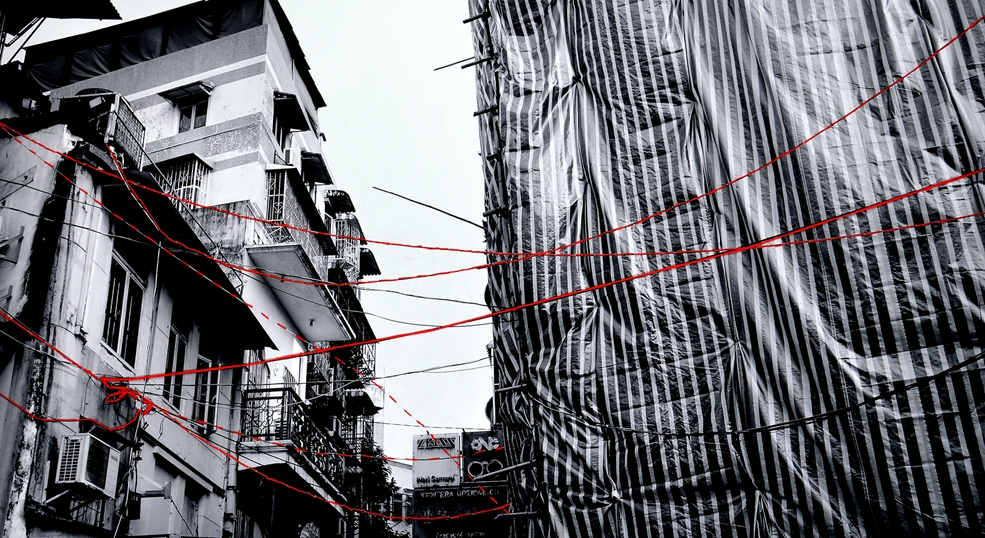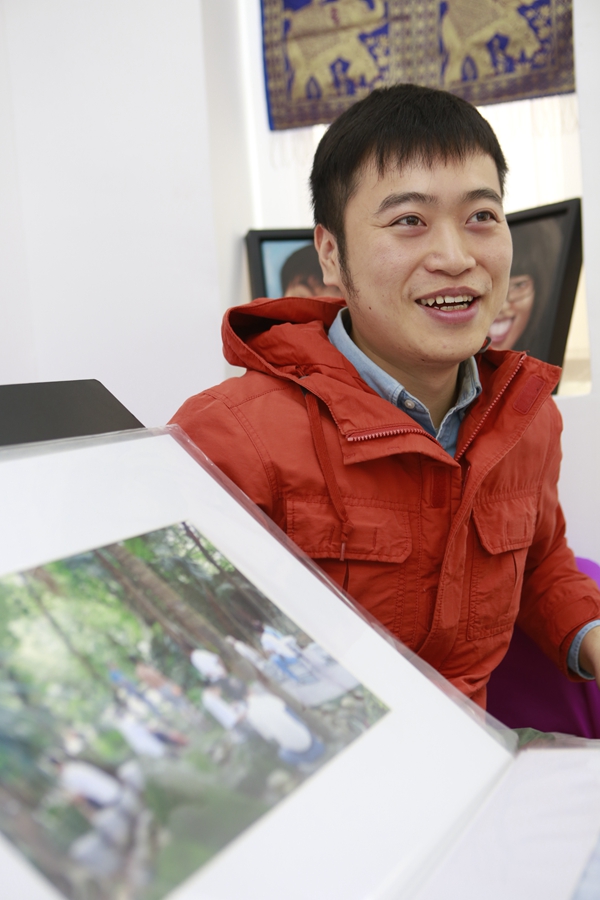Tang Kuok Hou is a local artist and an alumnus of the University of Macau’s Department of Sociology. His works mainly deal with interesting but oeat subjects such as artificial light sources, which he says are inspired by his education in sociology and anthropology. About a year ago, tired of his nine-to-five lifestyle, he quit his job and became a full-time artist. Asked what prompted him to make that decision, he says, ‘I knew the road ahead was not going to be easy, but I just wanted to do what I was passionate about while I was still young.’
Rethink Human-Nature Relationship
Tang’s current studio is located in Macao Art Garden, the city’s first
venue dedicated to local artistic creation and exhibition. So far nearly 50
artists have established studios there, and Tang is one of the few full-time
artists among them. Tang’s studio is less than 100 square feet, but he says it
does not hinder his creative process, because the entire society actually
serves as his studio.
After graduation from high school, Tang was admitted to the Department of
Digital Media Design at Ming Chuan University in Taiwan. But after spending two
years in Taiwan, he realised that design was not a career path he wanted to
follow. So he returned to Macao to pursue a degree in the Department of
Sociology at UM. The programme in sociology taught him to look at society from
different perspectives and prompted new ideas about how he might depict society
with his camera. ‘Ever since my college days, I have been raising questions about
life, such as what is the relationship between man and society?’ he says.
Over the past few years, artificial landscapes have been the main subject of
Tang’s works. ‘Landscapes were created for humans, but if the created space
fails to interact with humans, I would start to think about the original
meaning of space,’ he says. His daily observations led him to the realisation
that the urban environment is actually a kind of artificial landscape, and is
also the result of man’ acclimatisation to the natural environment. ‘For
instance, photosynthesis normally only occurs during the day. Cities are the
only place where photosynthesis also occurs at night. But we should not think
of light pollution only in terms of its damage. If there were no lights to illuminate
the city at night, the various functions of a city would come to a halt,’ he
says.
Sociology teaches critical thinking, but it also provides objective knowledge
about the persistence of social norms and forms. Many of Tang’s works,
including Acclimation and Line, are visual representation of the theories he
has learned in sociology. ‘There aren’t many photographers in Macao who focus
on landscapes, so the local audience isn’t very familiar with this subject.
Currently the collectors of my works are mostly foreigners.’
Think Critically
Tang’s works have a unique style. He attempts to deconstruct people’s
stereotyped impressions of cities and then reconstruct that impression by
reconnecting people, community, places, nature, and memory. His works are not
merely documentary photographs; they reflect his observations and
interpretations of society. Indeed, each work is a field study in sociology.
Apart from Human Scenery, his works are completely devoid of human presence.
But there are always clues, such as buildings and artificial light sources,
that point to human activity. ‘Although you can’t find humans in my works, you
will discover the interaction between humans and the city through these subtle
clues,’ he says. ‘I don’t want to show humans’ impact on the natural
environment in an explicit way. I want the audience to discover on their own
how humans affect and interact with nature in the same way a detective pieces
together clues to solve a case. I think it’s more interesting that way.’
Tang is grateful to his professors from the Department of Sociology, especially
Associate Professor Peter Zabielskis and Assistant Professor Lu Chia-Wen. ‘I
would often discuss questions with my professors after class, and they would
comment on my works and offer very good suggestions,’ he says. ‘Since my
college days, Peter and I have been discussing the different viewpoints in
sociology, and he has also taught me many valuable life lessons. These
discussions have inspired my works and made me see life in a different way.
Beyond the Casinos
Apart from his background in sociology, his childhood experiences are also
an important influence on his works. He grew up in a tenement in the Horta e
Costa District where people enjoyed close relationships with their neighbours.
But the fast economic growth in Macao led to a large influx of labourers and a
rapid expansion of housing estates, which in turn caused such close neighbourly
relationships to dissipate. Tang still remembers looking up, as a child, and
seeing the sky crisscrossed with power lines, a scene he rarely sees now. The
power lines in his work Line shows the changes in the residential communities
and the ever-distant relationship between people. ‘With the constant
restructuring in the housing estates, human interaction is becoming more and
more a matter of going through the motions. And gradually, coldness becomes the
default way in which people treat each other. I hope my works can help
foreigners understand that apart from casinos, there are also these kinds of
buildings in the old part of the city. More importantly, I want to help people
understand the changes in the Macao society and the cold way in which people
habitually interact with each other,’ he says.
Before becoming a full-time artist, Tang worked as a part-time artist’s
assistant in college, during which time he actively participated in art
exhibitions and competitions both at home and abroad. After graduation, he held
a clerical job for a year, but then decided to quit to become a full-time
artist. ‘I only live once. To me, spending eight hours every day in the office
doesn’t seem like a sensible way to spend this once-only life,’ he says. He
encourages students to discover their vocations as early as possible. ‘Finding
your vocation will make you happier. Your vocation may not become a full-time
job, but it can become a second career that you can work on for the rest of
your life.



